When it comes to the world of coffee, two distinct brews have long captured the hearts and palates of connoisseurs and coffee enthusiasts alike: Arabic coffee and Turkish coffee. These iconic caffeinated beverages, steeped in rich history and cultural significance, have transcended their regional origins to become beloved brews enjoyed worldwide. In this exploration, we embark on a journey to compare and contrast Arabic coffee vs Turkish coffee, uncovering the nuances of flavor, preparation methods, and cultural significance that distinguish these two exceptional coffee traditions. Join us as we delve into the delightful world of coffee, where every cup tells a story, and every sip carries the weight of tradition and heritage.
Reading fatigue? Switch to the article’s audio below.
- Arabic Coffee vs Turkish Coffee: A Flavorful Battle of Traditions
- https://app.mysoundwise.com/tracks/17003254418382236e.mp3
- What is Arabic Coffee?
- https://app.mysoundwise.com/tracks/17003256253914087e.mp3
- What is Turkish Coffee?
- https://app.mysoundwise.com/tracks/17003258286470923e.mp3
- Flavor Profiles
- https://app.mysoundwise.com/tracks/17003260163722043e.mp3
- Coffee Preparation
- https://app.mysoundwise.com/tracks/17003263828329663e.mp3
- Cultural Significance
- https://app.mysoundwise.com/tracks/17003264246715313e.mp3
- History and Origins
- https://app.mysoundwise.com/tracks/17003264590896509e.mp3
- Coffee Culture Today
- https://app.mysoundwise.com/tracks/17003264906127346e.mp3
- Conclusion & FAQs
- https://app.mysoundwise.com/tracks/17003265260266096e.mp3
Turkish Coffee vs Arabic Coffee: Key Differences
- Distinctive Flavor Profiles: Arabic coffee, traditionally prepared in a “dallah” offers a bold bitterness with a cardamom twist, while Turkish coffee, brewed in a “cezve” or “ibrik,” presents an intense, concentrated flavor without added spices.
- Cultural Significance and Rituals: Both Arabic and Turkish coffee hold deep cultural significance. Arabic coffee symbolizes hospitality and welcoming guests, while Turkish coffee is associated with mystical fortune-telling traditions.
- Modern Adaptation and Global Appeal: These ancient brews have gracefully adapted to the modern world, catering to global tastes and preferences while preserving their cultural heritage. The iconic coffee pots remain an integral part of these traditions.
- Coffeehouses as Cultural Hubs: Coffeehouses in Arabia and Turkey have played pivotal roles as centers of socialization, intellectual discourse, and cultural preservation, fostering a sense of community and tradition.
- A Rich Tapestry of Coffee: Arabic coffee vs Turkish coffee is not just a matter of taste; it’s a journey through time and culture, offering a rich tapestry of flavors, traditions, and experiences for coffee enthusiasts to explore and savor, with the distinctive coffee pots serving as cultural symbols of these traditions.
What is Arabic Coffee?
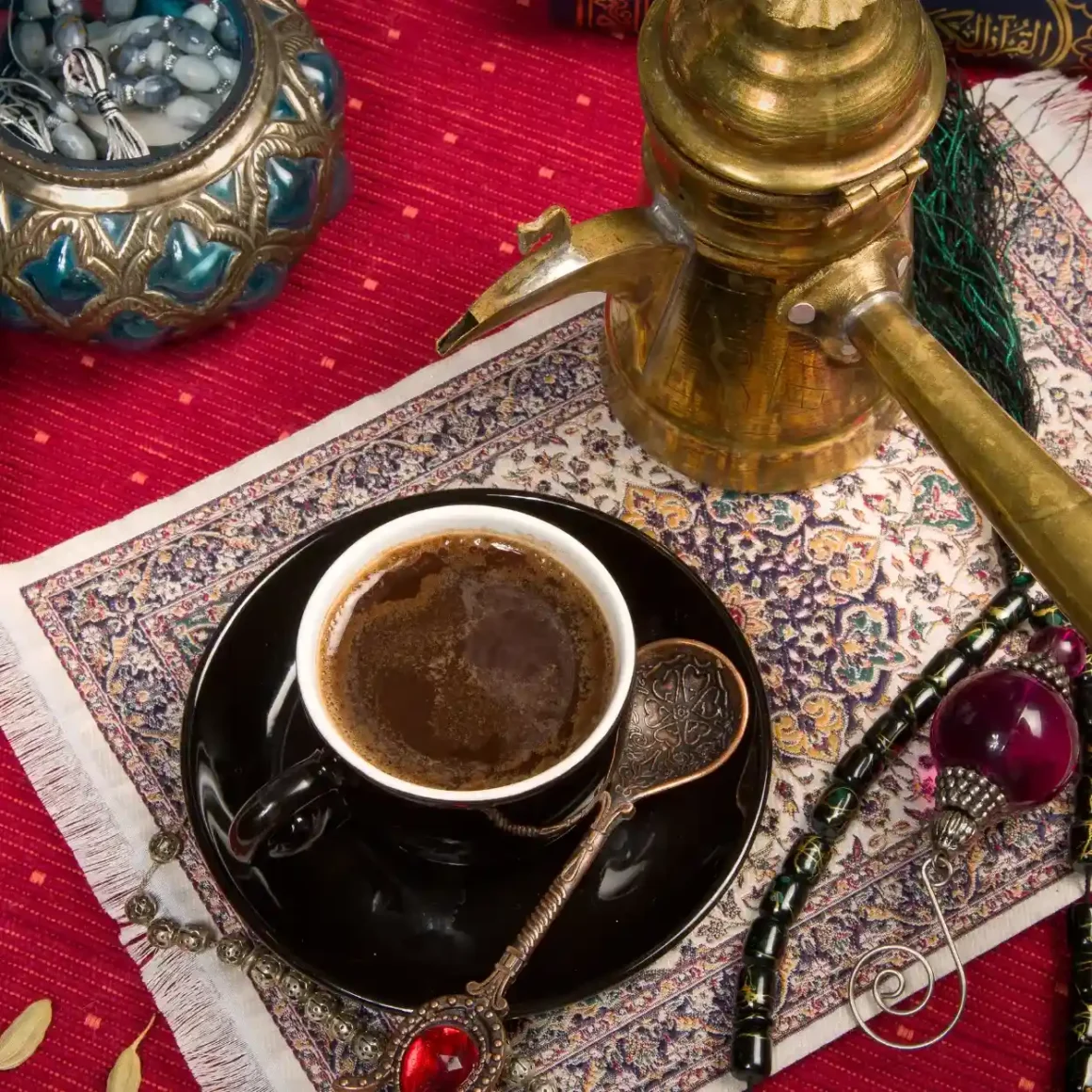
Arabic coffee, often referred to as “Gahwa” or “Qahwa,” is a traditional beverage with a rich cultural significance in the Arab world. It is not your typical coffee experience and is quite distinct from the popular espresso or brewed coffee you might be familiar with. Here are some key aspects of this lovely coffee:
- Ingredients: Arabic coffee is made using very simple ingredients – finely ground Arabica coffee beans, water, and cardamom. It’s the addition of cardamom that gives it its unique flavor and aroma.
- Brewing Process: Unlike the elaborate espresso machines or pour-over methods, this drink is brewed in a special small pot called a “dallah.” (1) The coffee grounds are simmered in water with cardamom over low heat until they produce a strong, aromatic brew. It’s then poured into small cups, often without sugar.
- Cultural Significance: This delightful coffee drink holds immense cultural importance in Arab hospitality. It is often served to guests as a symbol of warmth and welcome. The serving of Arabic coffee is accompanied by specific customs, such as holding the cup with the right hand and drinking it in three sips.
What is Turkish Coffee?
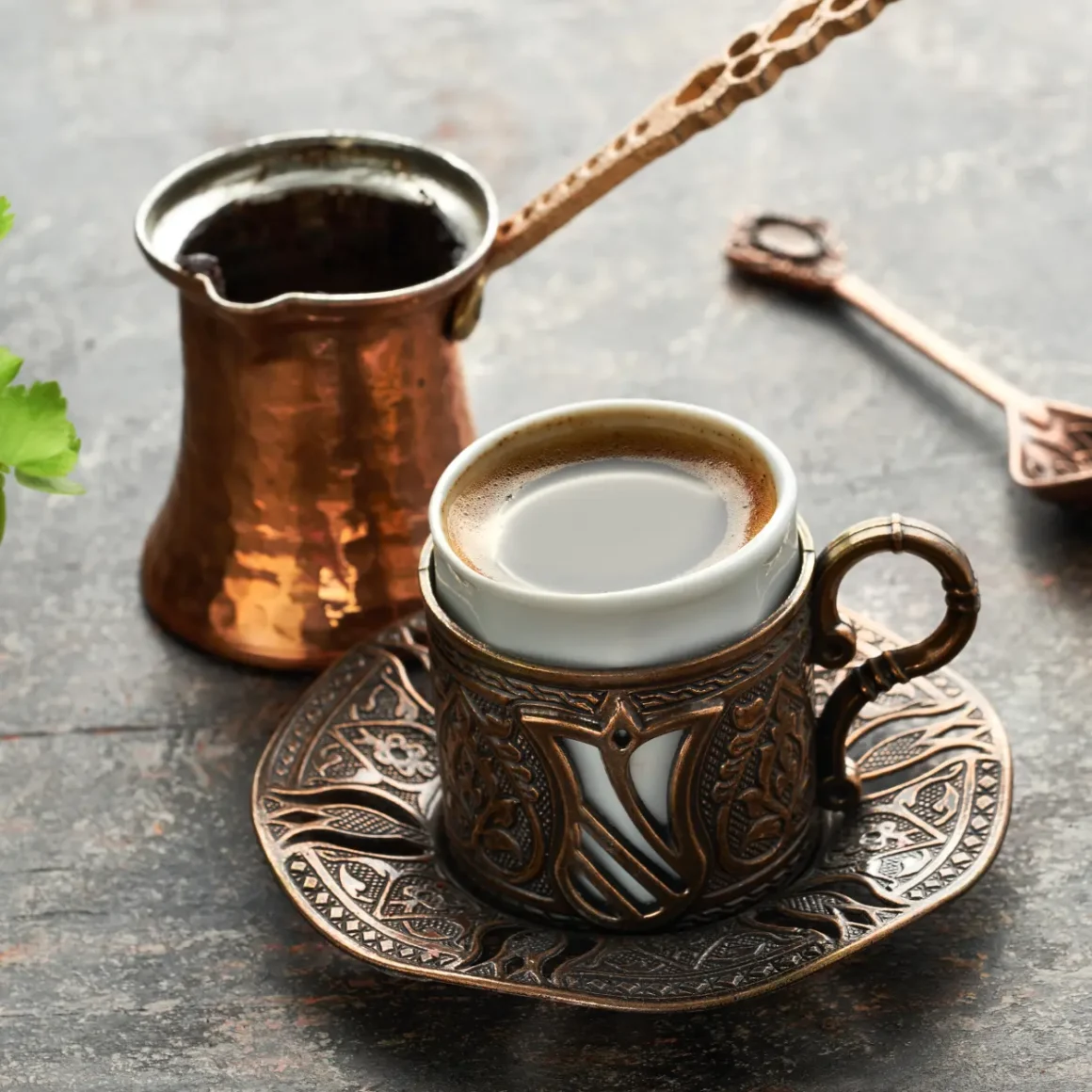
Turkish coffee, or “Türk kahvesi” in Turkish, is another unique coffee experience that has a long history and is deeply ingrained in Turkish culture. Here are the key characteristics of this coffee beverage:
- Ingredients: This succulent coffee drink is made from finely ground Arabica coffee beans, water, and sugar (optional). It does not typically contain spices like cardamom, which distinguishes it from Arabic coffee.
- Preparation: This coffee is prepared using a special Turkish coffee pot called a “cezve” or “ibrik.” (2) The coffee grounds, water, and sugar (if desired) are combined in the cezve and brewed together without stirring. It’s crucial not to disturb the grounds while brewing.
- Serving Style: This beverage is served in small cups, typically without milk or cream. The coffee grounds settle at the bottom of the cup, creating a thick, sludgy layer that is not meant to be consumed. Instead, the coffee is sipped slowly, and the grounds are left undisturbed.
- Ceremony and Tradition: Similar to Arabic coffee, this coffee drink has a ceremonial aspect. It’s often accompanied by rituals such as fortune-telling using the coffee grounds left in the cup. The art of making and serving this delicacy has been recognized as an important part of UNESCO’s Intangible Cultural Heritage.
In summary, Arabic coffee and Turkish coffee are both unique and culturally significant coffee traditions. Both beverages offer a distinct coffee experience that goes beyond just a drink, encompassing centuries of customs.
Arabic and Turkish Coffee: Flavor Profiles
Coffee is a diverse beverage enjoyed worldwide, and its flavor can vary significantly depending on the brewing method, ingredients, and regional traditions. Arabic coffee and Turkish coffee, two distinct coffee styles, offer unique flavor profiles that cater to different taste preferences. In this section, we will delve into the flavors of these delectable beverages.
The Bold and Robust Taste of Arabic Coffee
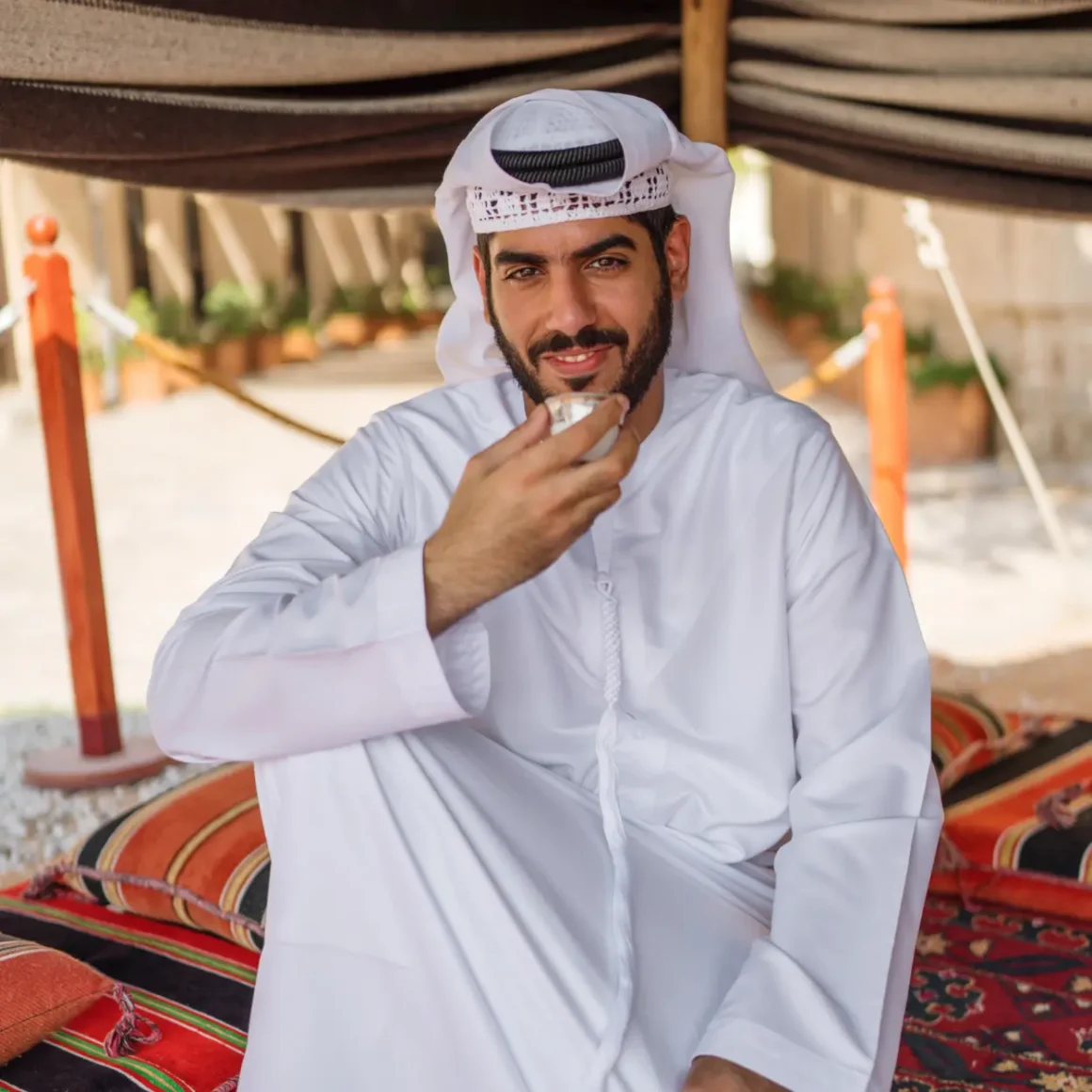
Arabic coffee is known for its bold and robust flavor, characterized by a unique blend of bitterness and a delightful cardamom twist.
- Bitterness with a Twist: This coffee drink is known for its bold and robust flavor. It typically carries a prominent bitterness, much like traditional black coffee, but a delightful cardamom twist complements it. This aromatic spice adds a layer of complexity to the brew, infusing it with a warm and slightly citrusy note. (3)
- Subtle Sweetness: Arabic coffee is rarely sweetened with sugar, allowing the natural bitterness of the coffee and the fragrant cardamom to shine. This results in a coffee experience that is less sweet compared to many Western coffee preparations.
- Balanced and Traditional: The flavor profile of this delectable beverage is a reflection of its cultural significance. It embodies the idea of balance and tradition, where the bitterness of coffee is tempered by the warmth of cardamom, creating a harmonious and timeless taste.
The Intense and Aromatic Turkish Coffee Experience

Turkish coffee offers a distinct and intense coffee experience, characterized by its concentrated brew and minimalistic approach to flavoring.
- Intense Concentration: This delightful coffee beverage offers an intense coffee experience. The coffee grounds are finely ground, creating a concentrated brew that is full-bodied and rich. This concentration results in a coffee with a stronger taste compared to Arabic coffee.
- No Spices, No Frills: Unlike Arabic coffee, this coffee drink is typically devoid of spices like cardamom. Instead, it relies solely on the flavor of the coffee beans themselves, which are ground to a very fine powder. This minimalist approach allows the pure essence of the coffee to shine through.
- Customizable Sweetness: This type of coffee can be customized in terms of sweetness. Sugar is added according to individual preference, ranging from unsweetened (sade) to sweet (şekerli). This adaptability means that Turkish coffee can cater to a wider range of sweetness preferences. (4)
Sugar and Spices: Sweetening the Brew
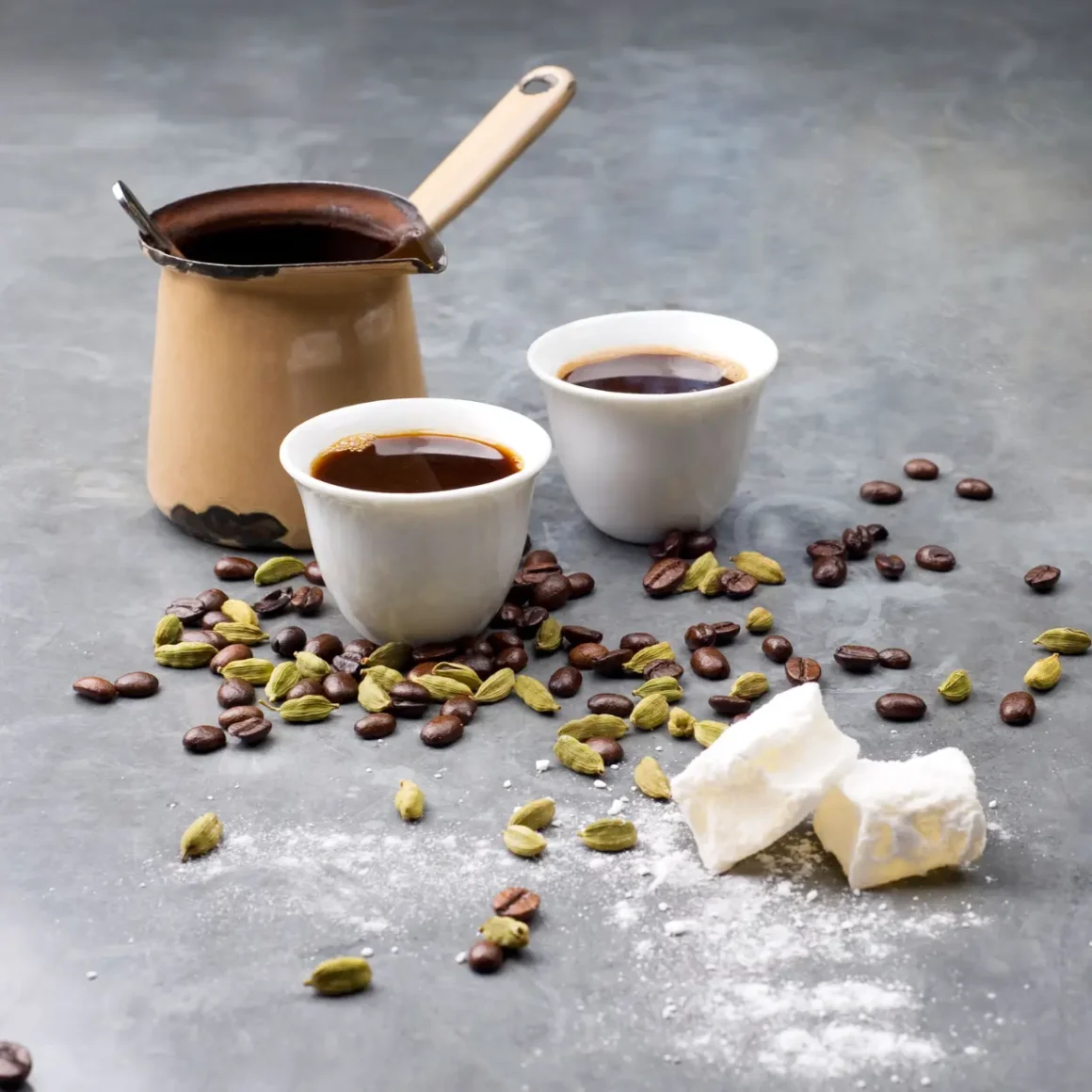
In the context of sugar and spices, both Arabic and Turkish coffee have distinct approaches.
- Sweetening in Turkish Coffee: As discussed above, this beverage offers more flexibility when it comes to sweetness. Sugar can be added during the brewing process to achieve the desired level of sweetness, making it adaptable to personal taste.
- Rare Sweetness in Arabic Coffee: In contrast, Arabic coffee is traditionally served with little to no sugar. Its flavor relies on the inherent bitterness of coffee beans and the aromatic cardamom, with the sweetness being an exception rather than the rule.
- Spices as Flavor Enhancers: The use of spices, particularly cardamom, in Arabic coffee, contributes to its flavor profile by introducing unique aromatic and citrusy notes. In Turkish coffee, the focus is on the coffee beans themselves, with minimal or no added spices.
In summary, the flavor profiles of Arabic vs Turkish coffee are distinctive and cater to different taste preferences. Arabic coffee is known for its bold and robust taste with a hint of cardamom, while Turkish coffee offers an intense and concentrated coffee experience, which can be customized in terms of sweetness. The presence of spices and the approach to sweetness make these two coffee traditions unique and worth exploring for coffee enthusiasts.
Turkish Coffee vs Arabic: Coffee Preparation
When it comes to preparing coffee, different cultures have developed their own unique methods and rituals. Arabic and Turkish coffee are no exceptions, each with its distinct brewing process, equipment, and ingredients. In this section, we will explore how to prepare these two culturally significant coffee styles and the essential equipment and ingredients required.
How to Brew Arabic Coffee: The Art of Al-Qahwa
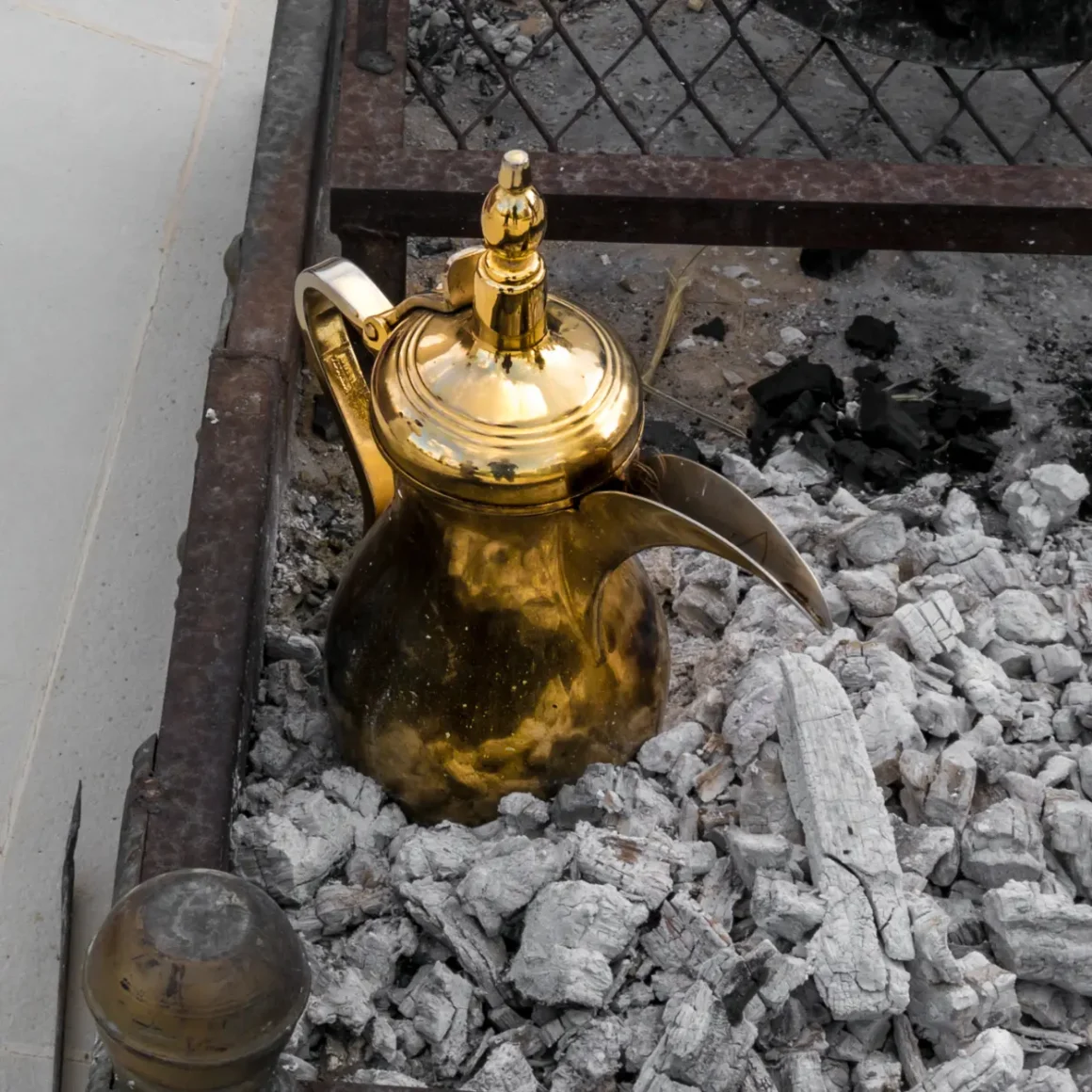
Arabic coffee, also known as Al-Qahwa, is more than just a beverage; it’s a symbol of hospitality and tradition in Arab culture. Here’s how to brew Arabic coffee:
- Select the Coffee Beans: Start with high-quality Arabica coffee beans, traditionally medium-roasted. The beans should be finely ground, almost to a powder-like consistency.
- Gather the Equipment: You’ll need a special small pot called a “dallah” or “ibrik” for brewing. Additionally, have small cups for serving and a long-handled spoon for stirring.
- Measure Water and Coffee: The ratio of water to coffee is critical. For every cup of water (about 60ml), use one heaping teaspoon of ground coffee.
- Add Cardamom (Optional): If you prefer, add a pinch of ground cardamom to the coffee grounds for a unique flavor twist. Cardamom is a common addition but entirely optional.
- Simmer Over Low Heat: Place the dallah pot on low heat and add the water, coffee, and cardamom (if used). Stir the mixture gently until it starts to simmer. Be patient; this type of coffee is brewed slowly.
- Foam Formation: As the coffee heats, a frothy foam will start to form. Allow this foam to rise but avoid letting it boil over. Once the foam rises, remove it from the heat.
- Serving Tradition: Arabic coffee is served in small, handleless cups. Hold the cup in your right hand as a sign of respect and drink it in three sips. This coffee drink is usually served without sugar, but you can add sugar to taste if you prefer.
How to Brew Turkish Coffee

This delectable beverage is renowned for its intense flavor and unique brewing process. Here’s how to make Turkish coffee:
- Select the Coffee: Opt for a high-quality blend, which is finely ground to a powder-like consistency, similar to cocoa powder.
- Choose Your Pot: A special small pot called a “cezve” or “ibrik” is used for brewing this type of coffee. The size should match the number of servings you intend to make.
- Measure Water and Coffee: The ratio is essential in this coffee preparation. For each cup of coffee, use one heaping teaspoon of coffee grounds and one cup (about 60ml) of cold water.
- Add Sugar (Optional): Sugar is optional and can be added to the cezve according to your preference. Common variations include unsweetened, mildly sweet, or very sweet (şekerli).
- Mix and Heat: Stir the coffee grounds and water in the cezve to combine. Place it over low heat and stir continuously without letting it boil. The goal is to dissolve the coffee completely without creating foam.
- Foam Formation: As the coffee nears the boiling point, a thick foam will start forming on top. This foam is an essential part of this drink. Once it reaches the brim, remove the cezve from the heat immediately.
- Serving Tradition: This delicacy is served in small cups, and it’s customary not to stir it after serving. Allow the coffee grounds to settle at the bottom, and enjoy the rich, concentrated brew.
Equipment and Ingredients
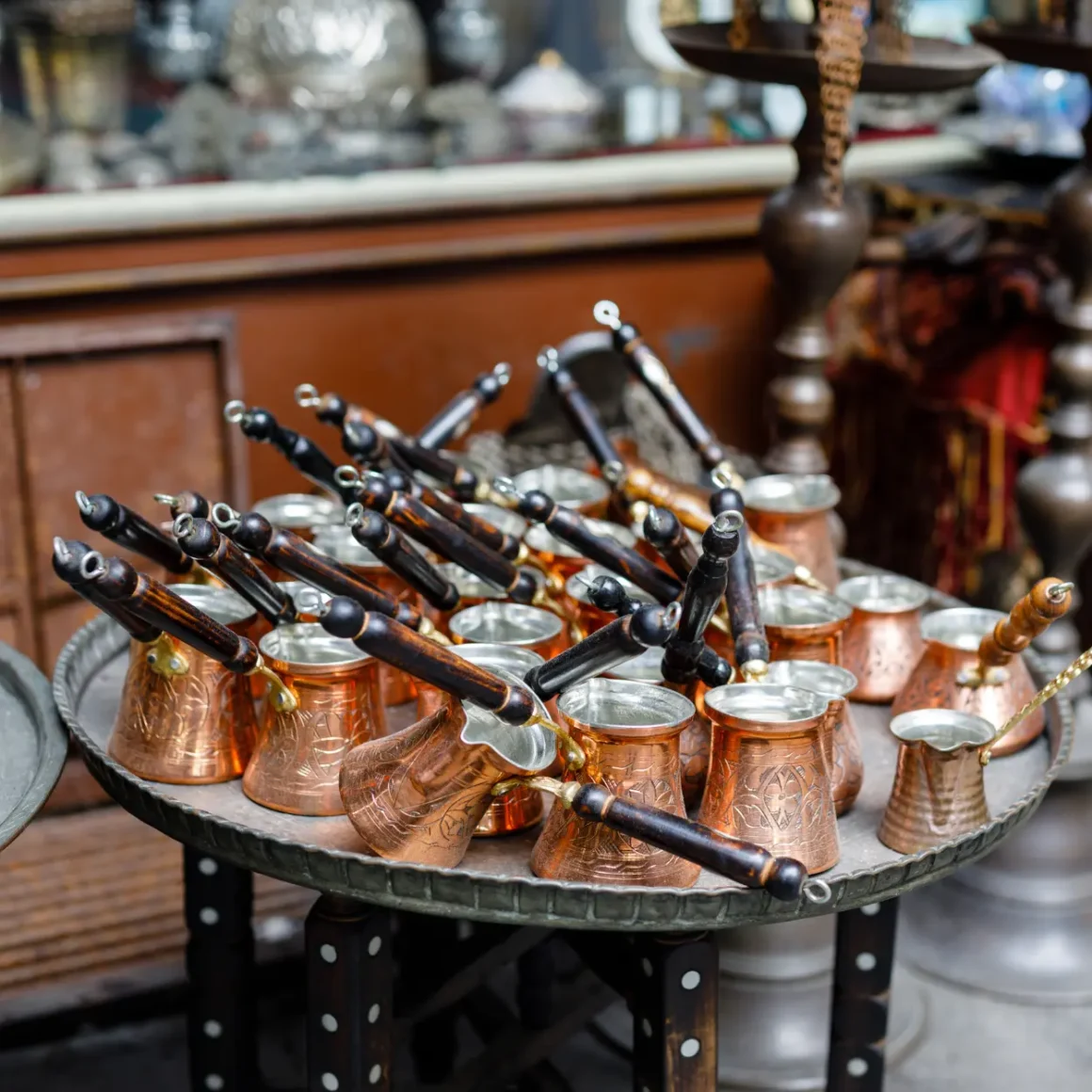
Both Turkish and Arabic coffee require specific equipment and ingredients for their preparation:
- Coffee Beans: High-quality, finely ground Arabica coffee beans are essential for both styles.
- Brewing Pot: Arabic coffee is brewed in a “dallah”, while Turkish coffee is made in a “cezve” or “ibrik.”
- Water: Use fresh, cold water for brewing. The water-to-coffee ratio is crucial for both styles.
- Cardamom (Optional): Cardamom can be added to Arabic coffee for a unique flavor twist, but it’s entirely optional.
- Sugar (Optional): Turkish coffee can be sweetened to taste with sugar during the brewing process, while Arabic coffee is typically served without sugar but can be sweetened if desired.
In summary, brewing Arabic and Turkish coffee involves specific methods and equipment. While Arabic coffee is known for its cardamom-infused, slow-brewed process, Turkish coffee is renowned for its concentrated, foam-topped brew. If you’re looking for the best Turkish coffee pot to enhance your coffee preparation experience, it’s essential to select the right equipment. Both coffee styles offer a rich and culturally significant coffee experience that is worth exploring and savoring.
Cultural Significance
Coffee has woven itself into the cultural fabric of various regions, often becoming more than just a beverage—it has become a symbol of tradition, hospitality, and even a medium for art, literature, and music. Turkish and Arabic coffee, known for their unique characteristics, hold distinct cultural significance in their respective societies.
Arabic Coffee: A Symbol of Hospitality

This delightful beverage holds a unique place in Arab culture; it embodies a profound symbol of hospitality and the art of welcoming guests.
- The Coffee of Welcoming: Arabic coffee is more than just a drink in Arab culture; it’s a symbol of hospitality and a means of welcoming guests. Offering this delightful beverage to visitors is a cherished tradition, signifying warmth and respect.
- Ceremonial Importance: The serving of this delicacy comes with its own set of customs and rituals. It is often prepared and served in a specific order, with guests receiving it as a gesture of honor. The traditional three sips of coffee are meant to symbolize various aspects of life.
- Community and Connection: This coffee drink is a catalyst for social gatherings and conversations. Families and friends come together over a cup of this aromatic brew, fostering a sense of community and connection.
Turkish Coffee: A Tradition of Fortune Telling

This delicacy plays a significant role in the age-old tradition of fortune-telling.
- The Art of Tasseography: This lovely beverage goes beyond mere consumption; it has a mystical aspect too. After finishing a cup of Turkish coffee, the leftover grounds at the bottom are used for fortune telling, a practice known as “tasseography” or “tasseomancy.”
- Cultural Connection: This unique tradition of fortune-telling using this coffee drink has deep cultural roots and is passed down through generations. It adds an element of mystery and intrigue to the coffee-drinking experience.
- Symbolism and Interpretation: The patterns and shapes formed by the coffee grounds in the cup are interpreted by skilled fortune tellers. These interpretations can encompass various aspects of life, from love and career to health and travel.
Coffee in Art, Literature, and Music

Coffee, a ubiquitous and beloved beverage in many cultures, has not only found its way into cups but also into the realms of art, literature, and music.
- Influence on Art: Mediterranean coffee, including Arabic and Turkish coffee, has often been a subject of inspiration for artists. Paintings and sculptures have depicted coffee ceremonies and the social aspects of coffee consumption.
- Literary Connections: Coffee features prominently in the literature of regions where Arabic and Turkish coffee are prevalent. Writers have woven coffee into their stories and poems, highlighting its role in daily life and culture.
- Musical References: In music, coffee has also left its mark. From traditional folk songs to contemporary compositions, references to coffee and its rituals can be found, underscoring its significance in the cultural tapestry.
Arabic and Turkish coffee transcend their role as mere beverages. They symbolize hospitality in Arabic culture, and fortune-telling in Turkish traditions, and serve as a source of inspiration in art, literature, and music. These rich cultural connections add depth and meaning to the act of enjoying a cup of coffee in these regions.
History and Origins of Arabic and Turkish Coffee
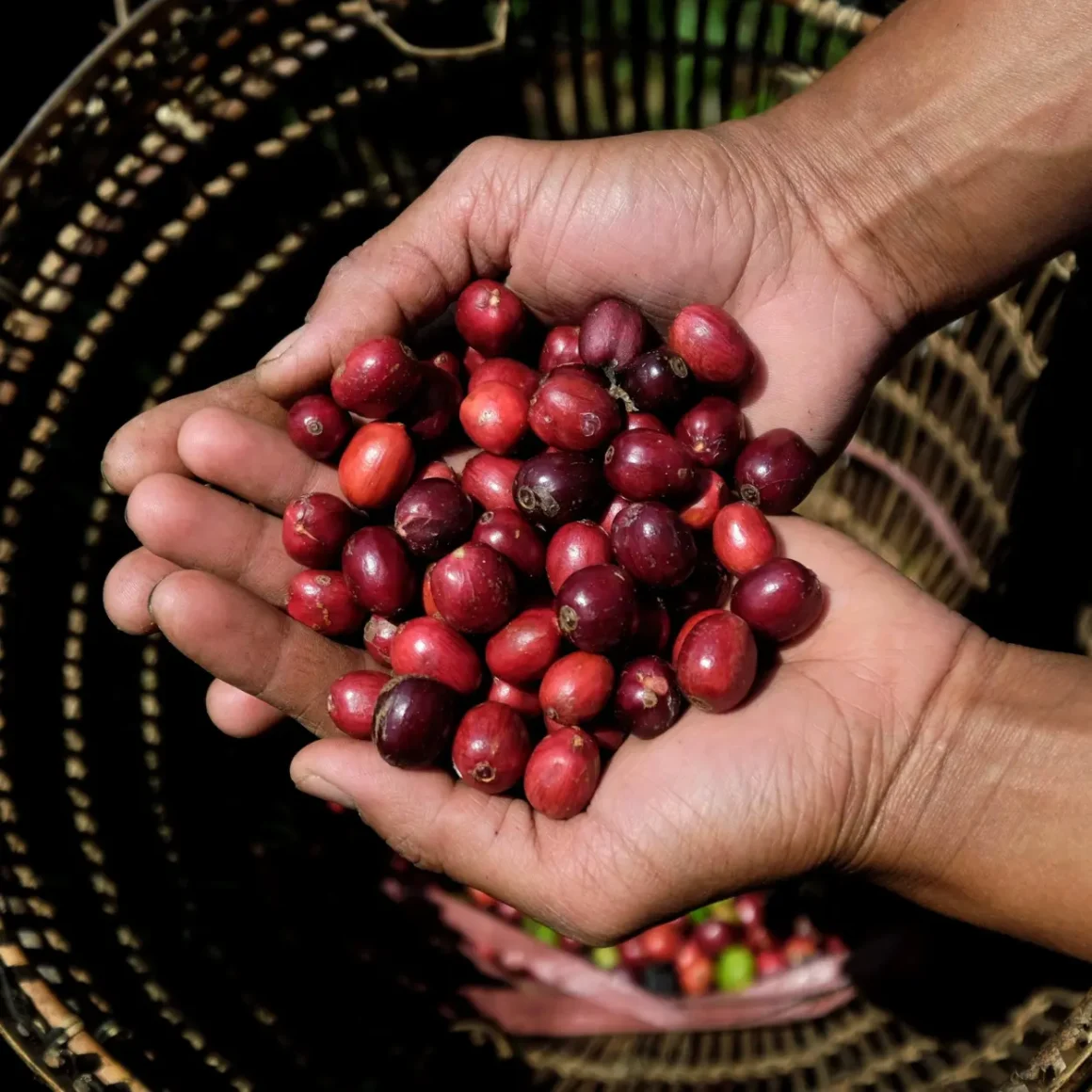
The story of coffee, with its intoxicating aroma and invigorating taste, is an epic journey that spans centuries and traverses continents. Rooted in the heartlands of the Arabian Peninsula and nurtured by the ancient civilizations of Yemen and Ethiopia, coffee has evolved into a global phenomenon. In this exploration, we embark on a captivating journey through time and space, tracing the ancient roots of Arabic coffee, the Ottoman influence that shaped Turkish coffee, and the enduring legacy of coffee houses in Arabia and Turkey.
Arabic Coffee’s Ancient Roots
Arabic coffee boasts a rich and ancient history that dates back to the coffee-growing regions of the Arabian Peninsula, particularly Yemen, and Ethiopia.
- Birthplace of Coffee: This coffee drink finds its roots in the mystical lands of Yemen and Ethiopia. These regions are considered the birthplace of the coffee plant, Coffea arabica, from which the term “Arabic coffee” derives.
- Legend of Kaldi: The legend of Kaldi, a Yemeni goatherd who discovered the stimulating effects of coffee after observing his energetic goats consuming coffee berries, adds a touch of enchantment to the origins of Arabic coffee.
- Pioneer of Coffee Trade: Yemen was among the first regions to cultivate and trade coffee, establishing itself as a significant center for coffee production and export. This early coffee trade played a pivotal role in introducing this delicacy to the wider world.
The Ottoman Influence on Turkish Coffee
This coffee drink, deeply ingrained in the cultural fabric of the Ottoman Empire, has its origins intertwined with the rise of this powerful civilization.
- Ottoman Introduction to Coffee: The Ottomans were introduced to coffee in the 16th century, and their fondness for this beverage played a substantial role in shaping the coffee culture of the time.
- Refining Coffee Preparation: Under Ottoman influence, coffee preparation underwent refinement. This led to the distinctive preparation method now known as “Turkish coffee,” which involves finely grinding coffee beans and brewing them in a specialized pot, often called a “cezve” or “ibrik.”
- Coffeehouses as Cultural Hubs: Turkish coffeehouses, known as “kıraathane,” emerged as vital centers for socialization, intellectual discourse, and entertainment in Ottoman society. These establishments became focal points for storytelling, chess matches, and musical performances, further enhancing the cultural significance of this delectable beverage.
Coffee Houses in Arabia and Turkey
The tradition of coffee houses, both in Arabia and Turkey, played a pivotal role in shaping the cultural significance of coffee in these regions.
- Arabian Coffee Houses: In Arabia, coffee houses, or “qahveh khaneh,” served as vibrant centers of community and conversation. Here, people gathered to share ideas, engage in discussions, and enjoy the aroma of freshly brewed Arabic coffee.
- The Coffee House Culture: Whether in Arabia or Turkey, the ambiance of coffee houses was infused with the rich aroma of freshly brewed coffee and the rhythmic sounds of conversation and laughter. These spaces were where friendships were forged, stories were shared, and the history of Arabic and Turkish coffee was preserved.
- Legacy and Influence: The legacy of these coffee houses continues to thrive today, preserving the traditions and cultural significance of Arabic and Turkish coffee. They stand as symbols of tradition, community, and the enduring heritage of these beloved coffee traditions.
To sum up, the history and origins of Arabic and Turkish coffee are intertwined with the cultural heritage of their respective regions. Arabic coffee finds its roots in ancient Arabia and Yemen, while Turkish coffee emerged as a result of Ottoman influence. The coffee houses in both regions have played pivotal roles in shaping the coffee culture, acting as centers of social interaction and intellectual exchange.
Coffee Culture Today
Coffee, once a humble beverage cherished in specific regions, has evolved into a global phenomenon that transcends borders and cultures. In this exploration, we delve into the modern expressions of coffee traditions, including the enduring significance of Arabic and Turkish coffee, their revival in the present day, and the dynamic trends and fusion creations that continue to shape the coffee landscape.
Arabic Coffee in the Modern World
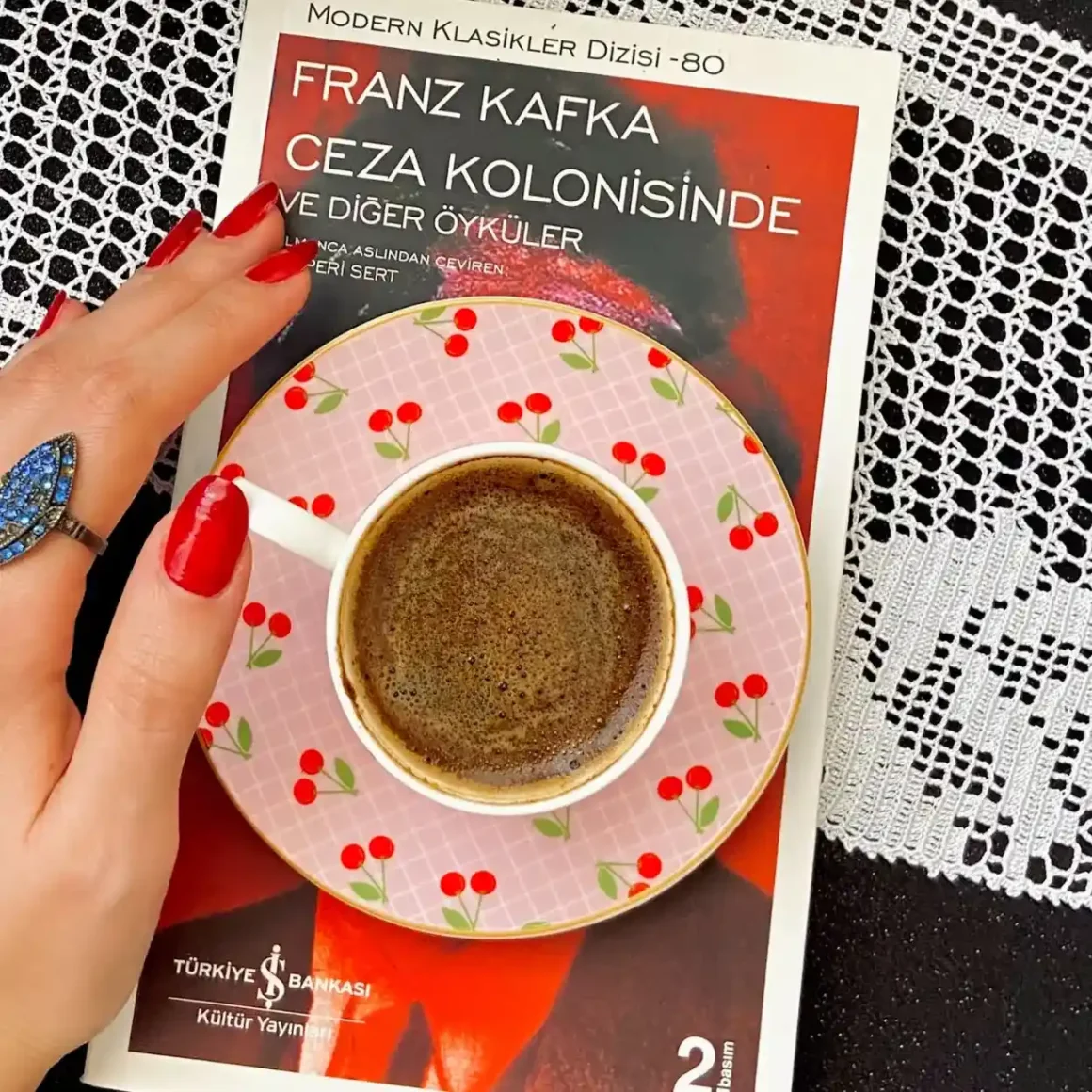
Arabic coffee stands as a testament to the enduring charm of tradition.
- Cultural Continuity: Arabic coffee has seamlessly transitioned into the modern world while retaining its cultural significance. It continues to be a symbol of hospitality, and the act of serving Arabic coffee to guests remains a cherished tradition across Arab households.
- Global Awareness: With the globalization of culinary experiences, Arabic coffee has gained international recognition. It is now enjoyed by coffee connoisseurs and curious drinkers worldwide who seek to savor its unique flavor profile and cultural richness.
- Cafes and Modernization: In contemporary times, traditional Arabic coffee preparation methods have been modernized to meet the demands of bustling urban life. Arabic coffee is readily available in cafes and restaurants, and its accessibility has contributed to its enduring popularity.
The Revival of Traditional Turkish Coffee
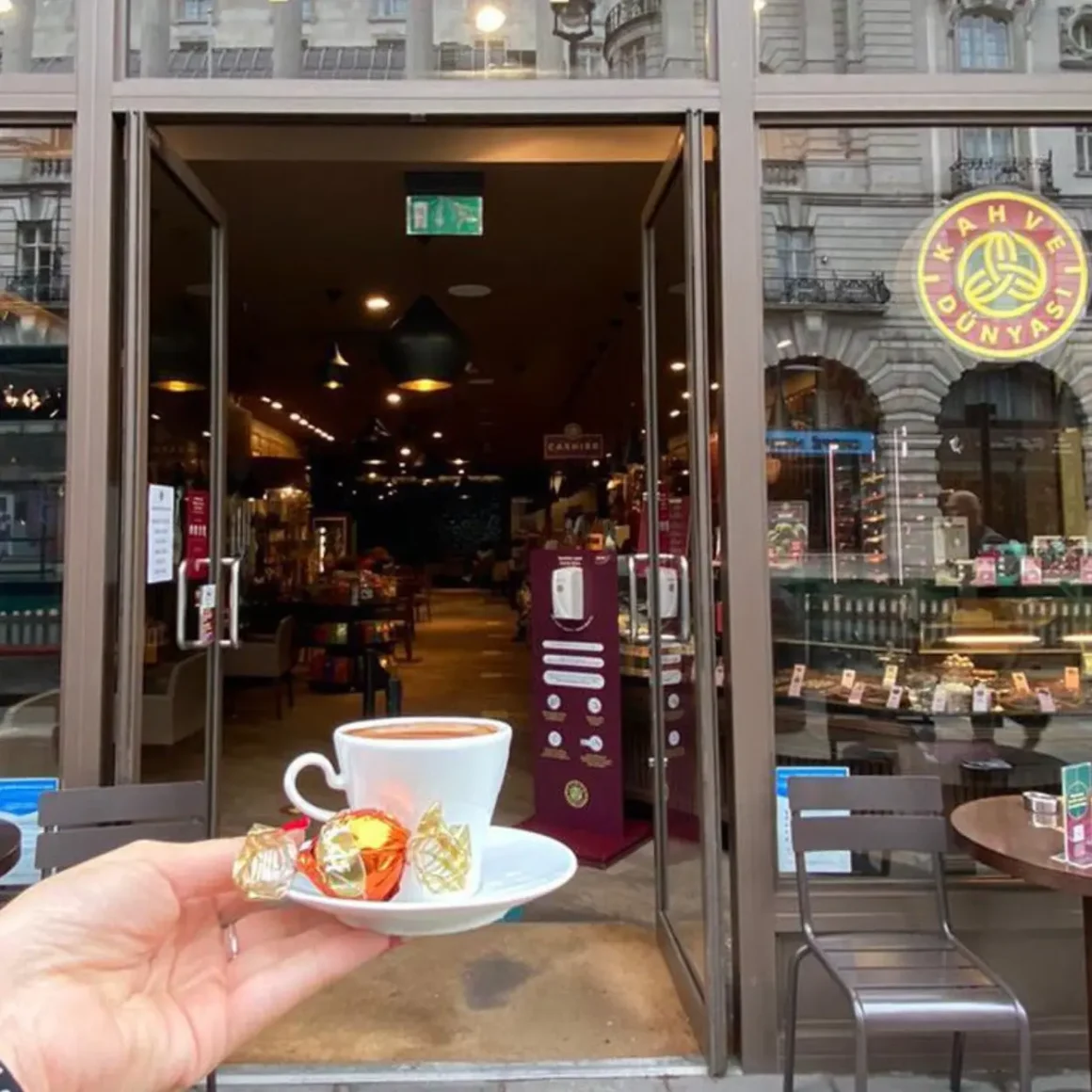
In an age marked by rapid change and innovation, there is a revival of the timeless traditions that have given this delicacy its enduring allure.
- Cultural Preservation: A Traditional cup of this lovely beverage, deeply rooted in history, has experienced a revival in recent years. Efforts to preserve this cultural treasure have led to a resurgence in its popularity, both within Turkey and beyond.
- Specialized Cafes: Specialized Turkish coffee cafes have emerged, offering authentic brewing methods and a nostalgic ambiance that harks back to the glory days of Ottoman coffeehouses.
- UNESCO Recognition: As previously mentioned, this coffee’s cultural significance was acknowledged by UNESCO in 2013 when it was inscribed on the Representative List of the Intangible Cultural Heritage of Humanity, further cementing its place in the modern world.
Coffee Trends and Fusion Creations
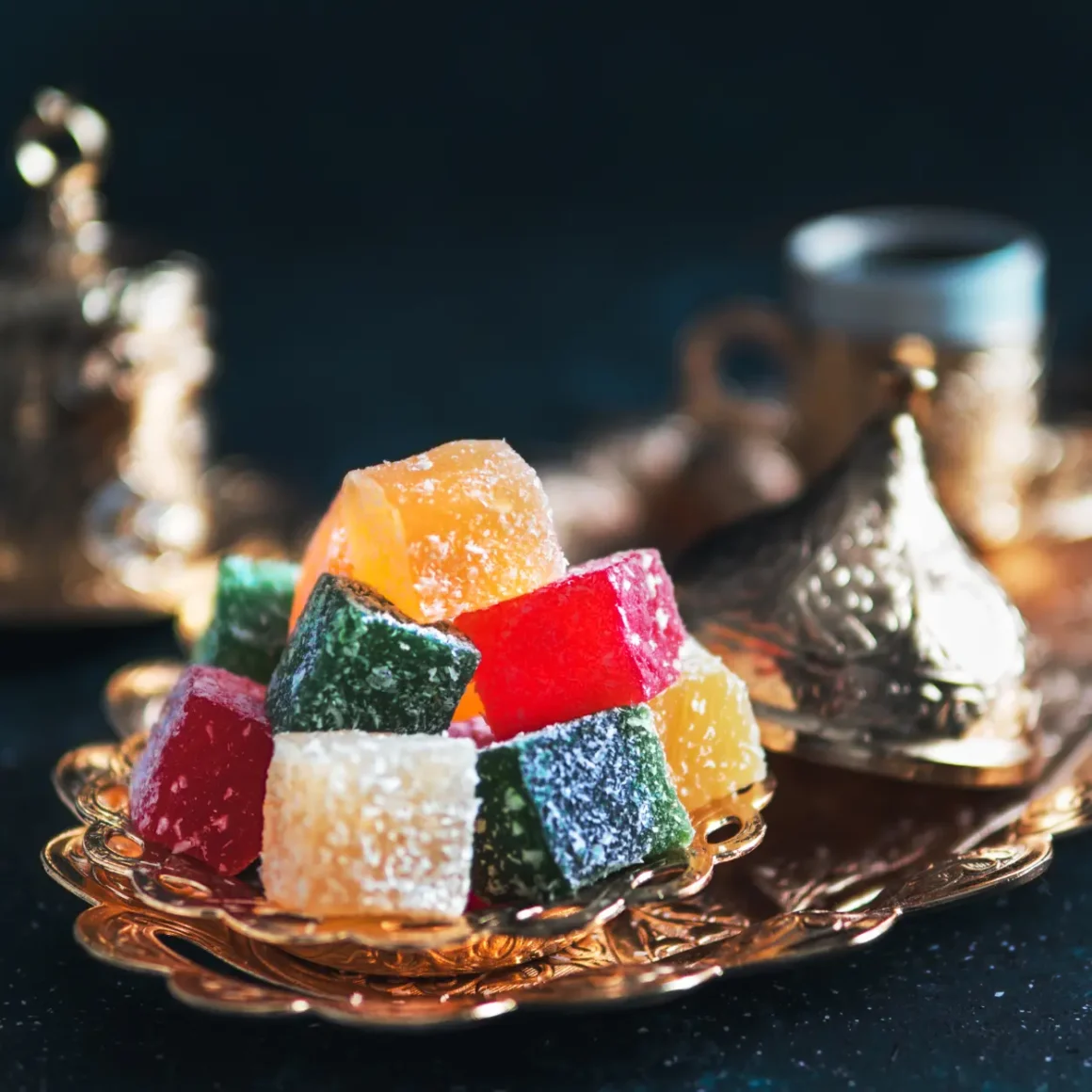
In the dynamic world of coffee culture, traditional Turkish and Arabic coffees are not immune to innovation and fusion.
- Specialty Coffee with a Twist: Specialty coffee shops and cafes have taken inspiration from Turkish and Arabic coffee to create innovative beverages. One trend is the infusion of traditional flavors into modern coffee drinks. For example, you might find specialty lattes infused with cardamom or served with Turkish delight, offering a delightful fusion of coffee traditions.
- Gourmet Turkish Coffee Variations: has seen a resurgence in popularity, with gourmet variations becoming a trend. These variations include unique flavors like pistachio, saffron, or rose water, offering a contemporary twist on the traditional brew. These gourmet Turkish coffees cater to a diverse range of tastes while preserving the essence of the original drink.
- Arabica vs. Robusta Blends: Another emerging trend involves blending Arabica and Robusta coffee beans to create a well-balanced and flavorful cup. While Arabic coffee traditionally uses Arabica beans, incorporating Robusta beans, which are known for their boldness and crema, adds a new dimension to the brew, appealing to a broader audience.
Overall, the modern coffee culture is a vibrant tapestry that interweaves traditions with innovation. Both beverages, with their deep cultural roots, have seamlessly transitioned into the contemporary world, adapting to changing tastes while preserving their unique heritage.
Conclusion
In the comparison of Turkish coffee vs Arabic coffee, we’ve explored the unique flavor profiles, cultural significance, and adaptation to the modern world of these iconic brews. Arabic coffee offers a bold bitterness with cardamom, symbolizing hospitality, while Turkish coffee provides an intense, spice-free experience associated with fortune-telling traditions. Both have gracefully adapted to the modern world while preserving their cultural heritage, and their iconic coffee pots remain essential symbols. Coffeehouses in Arabia and Turkey have served as hubs of cultural preservation and community. Overall, the rivalry between Turkish coffee and Arabic coffee is a celebration of diverse flavors and rich traditions, offering coffee enthusiasts an enriching cultural experience with each sip.
FAQ
How is Arabic coffee traditionally prepared and served?
Arabic coffee is traditionally prepared by simmering finely ground coffee beans with cardamom and served in small cups. It is a symbol of hospitality, often offered to guests in a specific ceremony.
What is the significance of fortune-telling with Turkish coffee grounds?
Fortune-telling with Turkish coffee grounds is a tradition deeply rooted in Turkish culture, believed to offer insights into one's future, love life, and more, adding mystique to the coffee experience.
How has coffee culture evolved in Arab and Turkish societies?
Coffee culture in Arab and Turkish societies has evolved to embrace modernization while preserving cultural traditions, making these brews accessible and beloved worldwide.
Can you enjoy Arabic and Turkish coffee outside their respective regions?
Yes, both beverages are enjoyed worldwide, with cafes and specialty shops offering these brews, allowing everyone to savor their unique flavors and cultural significance.























